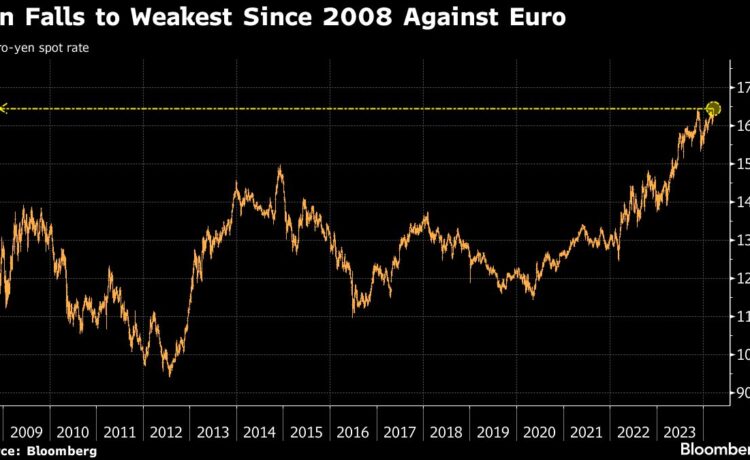(Bloomberg) — The yen fell to the weakest level since 2008 against the euro on speculation the Bank of Japan will keep its monetary policy accommodative even after it ended the world’s last negative-interest-rate policy on Tuesday.
Most Read from Bloomberg
Japan’s currency dropped as much as 0.3% to 164.35 per euro before trimming some of the losses. Against the dollar, the yen is falling toward a level unseen since 1990, extending its some 7% loss so far this year that made it the worst performer among Group-of-10 currencies.
The slide comes amid speculation the yen will remain under pressure to weaken due to Japan’s large yield discount to other developed economies, notably the US. BOJ Governor Kazuo Ueda and his officials’ insisted that financial conditions will stay loose even though the nation hiked its interest rates for the first time since 2007 and scrapped the yield-curve control regime this week.
“Yen is underperforming as markets interpreted the BOJ decision as a dovish hike,” said Alex Loo, strategist at TD Securities in Singapore. “We could see a convincing break above 165 on better eurozone data,” referring to the euro-yen spot rate.
Ahead of the BOJ’s decision, some 90% central bank watchers saw a chance of policymakers ending its negative rate settings at the meeting. The likelihood grew after the country’s largest union group announced first-round results to annual wage negotiations that exceeded expectations.
Investors are divided over how long it will take before the central bank opts for another rate hike. While analysts surveyed by Bloomberg are forecasting the BOJ’s policy target rate at 0.1% at the end of this year, indicating a majority doesn’t expect another rate hike as a base case, many others warned that authorities may not be finished.
–With assistance from Masaki Kondo.
(Adds background and quote.)
Most Read from Bloomberg Businessweek
©2024 Bloomberg L.P.
















